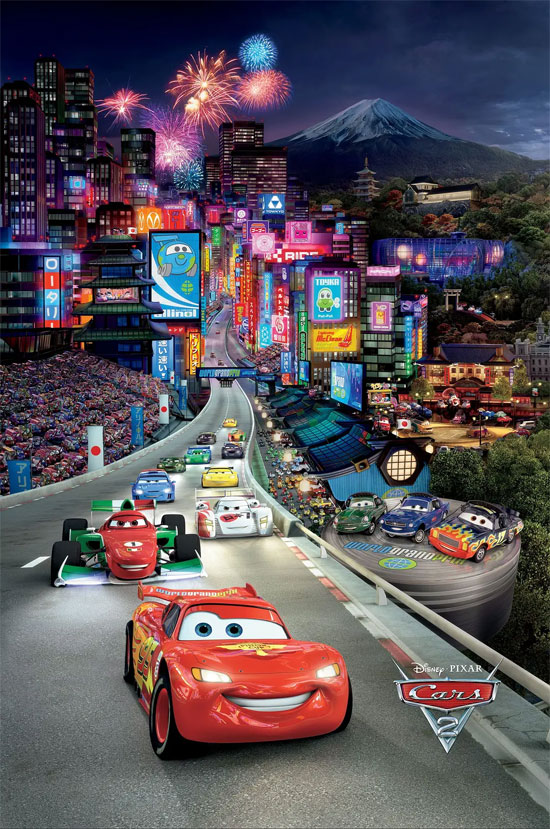Film Name: 赛车总动员2 / Cars 2

Both are second-rate machines covered in copper rust, both have a dazzling top-tier machine standing beside them for comparison, both perform beyond expectations for inferior products, making everyone realize that so-called lowly underdogs often possess superior hearts and courage… Sometimes I feel the themes of “Cars 2” and “Cars” are remarkably similar.
Yet, despite sharing a similar kind of simple-mindedness, Mater and WALL-E evoke entirely different feelings. Mater remains purely at the level of entertainment, while WALL-E elicits complex emotions like sympathy, warmth, sincerity, and deep moving moments. It can be said that Mater in the racing world falls far short of WALL-E in the world of robots. Why is that?
Because WALL-E’s clumsiness is a kind of innocence—he never feels inferior or lost about his lowly status. But Mater’s clumsiness is just for laughs; his every move and word seems designed to make you chuckle, yet after laughing, you can’t quite pinpoint what’s so funny. WALL-E’s clumsiness ultimately transforms into a relentless pursuit of love and a courage that fears no obstacle. Bite’s foolishness, however, is ultimately shattered by a sudden, inexplicable flash of insight. As a lowly, dilapidated car, it is inexplicably outfitted with high-end weaponry—if a lowly machine ultimately achieves victory and recognition solely through the acquisition of advanced weapons and equipment, can it truly represent the capabilities and value of the “class” of lowly machines?
WALL-E’s charm ultimately stems from a profound sense of tragedy. First, it is ignorant—unaware of the purpose behind its endless, unceasing labor on Earth, compelled only to follow human-programmed routines without purpose. Second, it is profoundly helpless—unable to withstand Earth’s sandstorms, and cowering in terror at the sight of an alien spacecraft, nearly burned alive. Yet this ignorant, helpless, battered robot consistently finds joy in self-entertainment, radiating optimism—enthusiastically collecting spare parts and cherishing a chance discovery of grass. Audiences feel profound compassion for such an endearingly simple character existing in such a hostile environment. Its ignorance and helplessness seemed to predestine a tragic ending, yet its innocence and charm added bright notes to this sorrowful melody. Overall, this tragic sentiment is profound and richly layered.
Bitey was entirely different. He too was ignorant, unaware of what wasabi tasted like, and ate a large dollop of it as if it were ice cream. However, his ignorance was purely factual—it didn’t extend to contemplating the meaning of life. He knew exactly who he was, what he was doing, and why he was doing it. He had friends, thoughts, and emotions—he felt joy, anger, sorrow, and happiness. In other words, learning from mistakes—Beta won’t eat mustard again next time, and thus won’t appear so ignorant. But WALL-E can’t even learn from such a mistake. There’s no trace of tragedy in him; instead, he’s filled with clownish, comedic antics.
The difference between Mater and WALL-E lies in the contrast between comedic and tragic sensibilities. While audiences cherish both genres, tragedy often leaves a deeper impression because it provokes more profound reflection than comedy.
Beyond that, I also found the dialogue in “Cars 2” excessively verbose. This verbosity isn’t limited to the TV station’s lengthy, largely meaningless banter about Doc, the Italian race car, and Mater. It also manifests in the film’s weighty speeches meant to convey its themes. In truth, some things are better left unsaid.
The film has two central themes it aims to express: the value of friendship and the inherent worth of lesser machines. The film relentlessly hammers these themes home through the protagonists’ heavy-handed speeches, as if afraid the audience might miss them. While such sentimental themes about friendship can be conveyed through the mouths of characters like Mater or Lightning McQueen, the social commentary about the inherent value of lowly machines might have been more effective if left unsaid, allowing viewers to grasp it organically. In the film, when surrounded by villains, Mater proclaims that even despised vehicle types can contribute their abilities, and that immense wealth doesn’t guarantee true happiness. Such direct statements, I believe, actually lower the film’s intellectual appeal. Sometimes, leaving room for the audience to ponder is crucial.
In contrast, Cars also explores two themes: love transcending class and environmentalism. While the film delivers weighty speeches to emphasize the importance of environmentalism and returning to Earth’s home, it maintains a relatively vague and gradual approach to the theme of class-transcending love, leaving ample room for the audience’s imagination.
Please specify:Anime Phone Cases » Cars 2 2011 Animation Film Review: Where does the female die fall short of WALL-E?